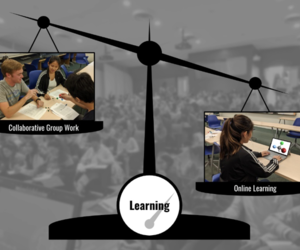Research in Chemical Education at UC Riverside broadly focuses on assessing the impact of innovative classroom interventions on student outcomes. Classroom interventions that are being investigated include flipped classroom structures, online learning interventions, classroom activities that promote conceptual learning, and the use of technology-enhanced curriculum materials.
Graduate students who wish to include chemistry education as part of their research experience can do so by completing a Designated Emphasis (DE) in Chemistry Education. This would involve carrying out a side project in chemistry education in addition to your normal laboratory research.
The requirements for the DE in Chemistry Education are provided here.

Representative Publications:
- J.F. Eichler* and J. Peeples, “Flipped classroom modules for large enrollment general chemistry courses: a low barrier approach to increase active learning and improve student grades,” Chemistry Education Research and Practice, 2016, 17, 197-208. DOI: 10.1039/C5RP00159E
- M.D. Casselman,* K. Atit, G. Henbest, C. Guregyan, K. Mortezaei, and J.F. Eichler,* 2020 (Article ASAP), "Dissecting the flipped classroom: Using a randomized controlled trial experiment to determine when student learning occurs." Journal of Chemical Education, DOI: 10.1021/acs.jchemed.9b00767
- L.E., Talbert, J. Bonner, K. Mortezaei, C. Guregyan, G. Henbest, and J.F. Eichler,* 2020, "Revisiting the Use of Concept Maps in a Large Enrollment General Chemistry Course: Implementation and Assessment." Chemistry Education Research and Practice, DOI: 10.1039/C9RP00059C
Faculty Research Descriptions:
My scholarly activity focuses on implementing and assessing the effectiveness of evidence-based instructional practices, primarily in large-enrollment organic chemistry courses. My primary focus is measuring and understanding how a flipped classroom environment improves student learning gains and course success metrics, whether it be the online/independent or the in-person/collaborative learning environment. Other research interests include the implementation of course-based undergraduate research experiences (CURE) in laboratory courses.
My focus of scholarly activity lies in developing, implementing, and assessing more engaging learning environments for large enrollment undergraduate chemistry courses. I have explored the impact of flipped classroom structures on student outcomes, the efficacy of a fully online structure in a preparatory chemistry course, and how concept development activities can be integrated into an existing flipped classroom structure. My current work focuses on how the flipped classroom can be leveraged to facilitate deeper conceptual understanding of core chemistry concepts.
Chemistry Education and Computational Chemistry: The Hartman group applies evidence-based practices in the classroom and beyond to make chemistry education more effective, engaging and accessible. Recent projects include the development of interactive simulations for general chemistry and designing machine learning tools to monitor and improve student engagement. We are also exploring new ways to use computational chemistry to bring research into the general chemistry classroom.
